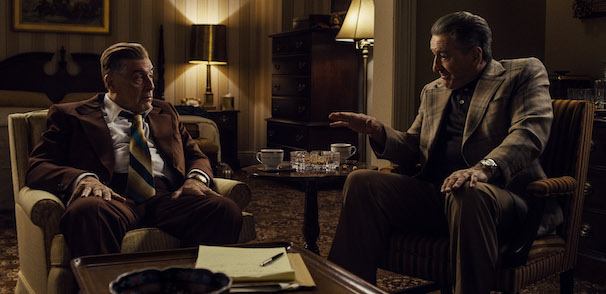
ReelBob: ‘The Irishman’ ★★★½
By Bob Bloom
The dialogue in “The Irishman” is rather mundane and dull, but the meaning behind the words — ah, that is something completely different. As a whole, it is scintillating. The way the words are used, the glances and facial expressions that accompany them, convey an entirely different connotation.
Everyone speaks in euphemisms; it’s like a secret code understood only by members of an exclusive club.
Martin Scorsese’s latest movie can be seen as a distant cousin to “Goodfellas,” sort of a “Geriatricfellas.” The film reunites Scorsese and two of his favorite actors-collaborators — Robert De Niro and Joe Pesci. Throw in Al Pacino, and you have a Mount Olympus of talent.
The movie plays like a Scorsese’s greatest hits, a mashup of familiar types and situations he has examined in earlier efforts.
And, like such movies as the aforementioned “Goodfellas” and “Casino,” “The Irishman” uses voice-over narration to propel and explain events, and it shows the same incidents from multiple perspectives.
At nearly 3½ hours, “The Irishman” lacks the crackling energy and pace of earlier Scorsese movies. That is because, at its core, it is a melancholy story of an individual looking back on his life — alone and in his twilight years — and the irrevocable choices that defined him and his relationships, especially with his family.
The movie is based on a book, “I Hear You Paint Houses,” by Charles Brandt, which tells the story of Frank Sheeran, an assassin who supposedly confessed to the killing of former Teamsters president Jimmy Hoffa.
The film, adapted by Steve Zaillian (“Schindler’s List”), is told in flashback by an aging Sheeran (De Niro) — old and sickly, living alone in a nursing home.
Sheeran, a World War II veteran, was a member of the Philadelphia chapter of Teamsters. He also ripped off some of the companies for whom he was driving to earn extra money. His sideline led him into the sphere of Philadelphia crime boss Russell Bufalino (Pesci), for whom he began doing favors — some of them deadly.
His work also brought him to the attention of Hoffa (Pacino). Hoffa’s first words to Sheeran are, “I hear you paint houses,” a neutral term for murder. Soon, Sheeran is helping Hoffa by intimidating truck-company executives and keeping in line union challengers to Hoffa or making them disappear.
But “The Irishman” isn’t so much about Sheeran’s body count as it is about the effect his work has on his family — and himself.
He justifies what he does by believing he is supporting and protecting his wife and daughters. As far as he knows, they are ignorant of his deadly profession.
His daughter, Peggy (Lucy Gallina as a child and Anna Paquin as an adult), is aware of who her father really is. That knowledge creates a lifelong estrangement that Sheeran never comprehends.
“The Irishman” is a meditative feature in which Scorsese takes his time in creating a dark and dangerous world in which loyalty and absolute fidelity are the currency of the realm. The movie takes its time, slowly unfurling its story, allowing the audience time to reflect on events.
What propels the movie is the performances of its trio of legendary actors. De Niro’s Sheeran seems to be carrying a heavy weight inside. He has chosen a life that he seems to regret but doesn’t really want to escape.
He tries to be a facilitator to avoid the violence he knows he will be compelled to commit.
Pesci, who usually plays flamboyant and boisterous gangsters, is quieter and contemplative as Bufalino. His facial gestures speak volumes — a nod of the head, a long glance or stare can seal a man’s fate.
He seems regretful when he has to order a hit, always seeming — through Sheeran as his intermediary — to try reasoning with an intended target before resorting to his final solution.
Pacino has the showy role as the bombastic Hoffa, a prideful and loud man who sees the Teamsters as his fiefdom. His Hoffa believes that, because he helped found the union, it is his to do with as he pleases. He is an egocentric individual who refuses to compromise and take advice.
His hubris leads to his downfall.
“The Irishman” is like a veteran rock ‘n’ roll band on a farewell tour performing its golden oldies. Scorsese, De Niro, Pacino and Pesci infuse the movie with a lifetime of experience in front and behind the camera. They make every scene look so natural and effortless that you forget the preparation necessary to create their characters.
“The Irishman” is a sad saga that fails to offer absolution to any of its characters. Whether you see it in the theater or later on Netflix, it is worth viewing because it feels like the end of a cinematic era.
Scorsese may be a bit self-indulgent, and some scenes may feel as if they are borrowed from his earlier films. That should not keep you from watching a master director and three of the most venerable actors in movies doing what they do best — pulling us in and showing us places we ourselves would not dare venture.
I am a founding member of the Indiana Film Journalists Association. My reviews appear at ReelBob (reelbob.com) and Rottentomatoes (www.rottentomatoes.com). I also review Blu-rays and DVDs. I can be reached by email at bobbloomjc@gmail.com or on Twitter @ReelBobBloom. Links to my reviews can be found on Facebook, Twitter and LinkedIn.
THE IRISHMAN
3½ stars out of 4
(R), graphic violence, language